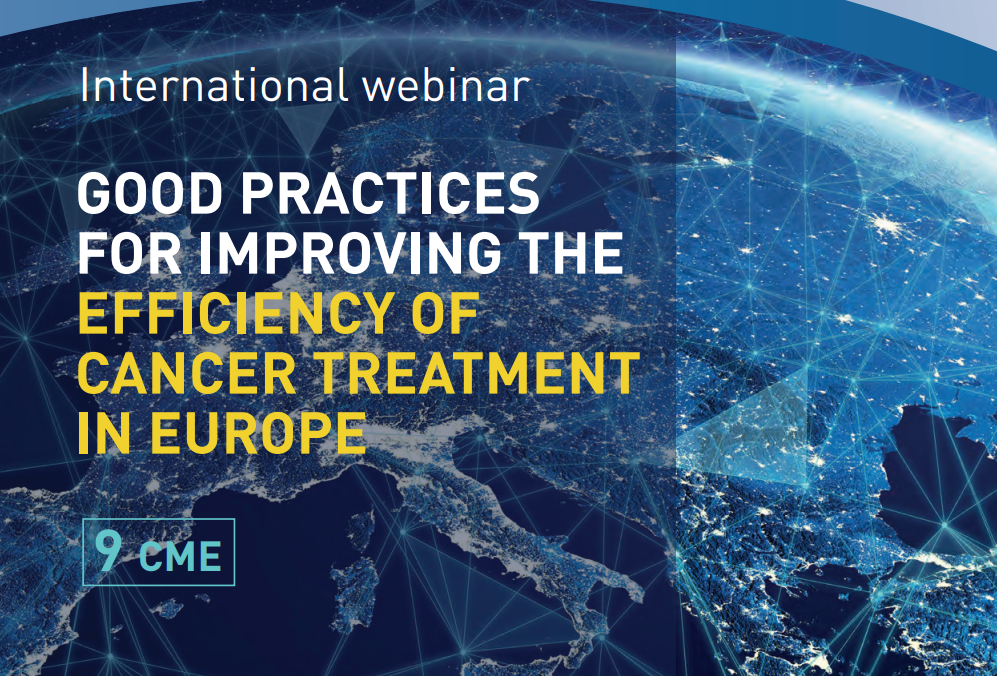
On the 5th and 6th of May, Sanitanova hosted an international webinar, with scientific coordination of EUREGHA and under the auspices of AReSS Puglia, to showcase and discuss Good Practices for improving the efficiency of cancer treatment in Europe, broadcasted online and on Italian television in two languages (English and Italian). It was a pleasure for EUREGHA to contribute and co-facilitate this important bridge between the policies and practicalities of cancer treatment and care, an issue high on the agenda for the European Commission as well as EUREGHA’s members.
In two days, representatives from the European Commission, the European Committee of the Regions (CoR), civil society, and local healthcare institutions presented their views, experiences, and Best Practices for cancer treatment and prevention. This article contains a compact overview of the exchanges, with links to re-watch the recorded presentations and a highlights video, to download the slides, and to read EUREGHA’s Booklet with Best Practices on cancer from our members. You can find the agenda of the event here.
On 5th May, after the introductory remarks by Giovanni Gorgoni, Chair of EUREGHA and Director General of AReSS Puglia, Birgitta Sacredéus, Member of the CoR and Chair of the Interregional Group on Health and Wellbeing dialed into the studio virtually and emphasized the value of collaboration between the European and local levels of government, and between healthcare providers in different countries. “Health is wealth”, she said, as she reminded the audience that prevention and screenings in combination with promoting a healthy lifestyle are very important when it comes to beating cancer. She explained Sweden’s National Cancer Strategy is patient-focused and aiming for equality of access to care through six regional cancer centers.
Next, the Team Leader of Europe’s Beating Cancer Taskforce, Matthias Schuppe from the European Commission’s DG SANTE outlined the challenges and opportunities presented by Europe’s Beating Cancer Plan, presented in February 2021. Prevention, early detection, diagnosis and treatment, and quality of life of patients and survivors are the four pillars contained in the plan, with several other cross-cutting themes such as digitalized and personalized medicine and reducing inequalities. With 4 million euros budget, this plan is the flagship and driving force behind fighting cancer in Europe. Annika Nowak, Head of Sector Cancer Mission secretariat at DG RTD, informed the audience further by sharing some of the activities of the EU Mission on Cancer with the audience. This instrument exists separately from the Cancer Plan, although there naturally is some overlap.
Later on the first day, the audience listened to Eduardo Pisani, CEO of All.Can International talk about how to build efficiency in cancer care, and received a crash course in “cancer economics” from Wim van Harten, CEO of Rijnstate Hospital in Arnhem (NL). Then it was time for some hands-on collaboration and exchanges through a live workshop on digital transformation in oncology and contamination between European models.
On day 2, Domenico Galetta, Director Medical Thoracic Ontology IRCCS Clinical Cancer Center “Giovanni Paolo II” in Bari, held a keynote talk on precision oncology and person-centered care. After this intellectually stimulating opening, it was time for some of our EUREGHA members to take center stage and showcase their local Good Practices in improving efficiency of cancer treatment. Mariangela Ciccarese, Apulia (IT) presented their experience with new digital cancer care processes, Josep M. Borras, Catalonia (ES) shared their regional perspective on planning for cancer control, Giuseppe Longo, Emilia Romagna (IT) explained the ins and outs of their multi-stakeholder approach to drug governance, and Annemie Haelens and Eliane Kellen, Flanders (BE) gave insight into the challenges and opportunities of their cervical cancer screening program. Furthermore, Ioanna Nixon, Scotland (UK) presented their achievements in quality control, research and clinical innovations, Elio G. Rossi, Tuscany (IT) showcased their innovative integrative approach to cancer patients, and Pierfranco Conte, Veneto (IT) explained the role of the Veneto Oncology Network in combining clinical trials with real-world evidence.
Lastly, Tit Albreht from the National Institute of Public Health of Slovenia shared a few words on the importance of European, national and regional cancer networks.
You can re-watch all the presentations by EUREGHA members and other speakers, and download the accompanying slides via the buttons below and on the right-hand side of this article. If you would like to learn even more, follow the link to EUREGHA’s Booklet on Cancer to read everything about the best practices from our members.


